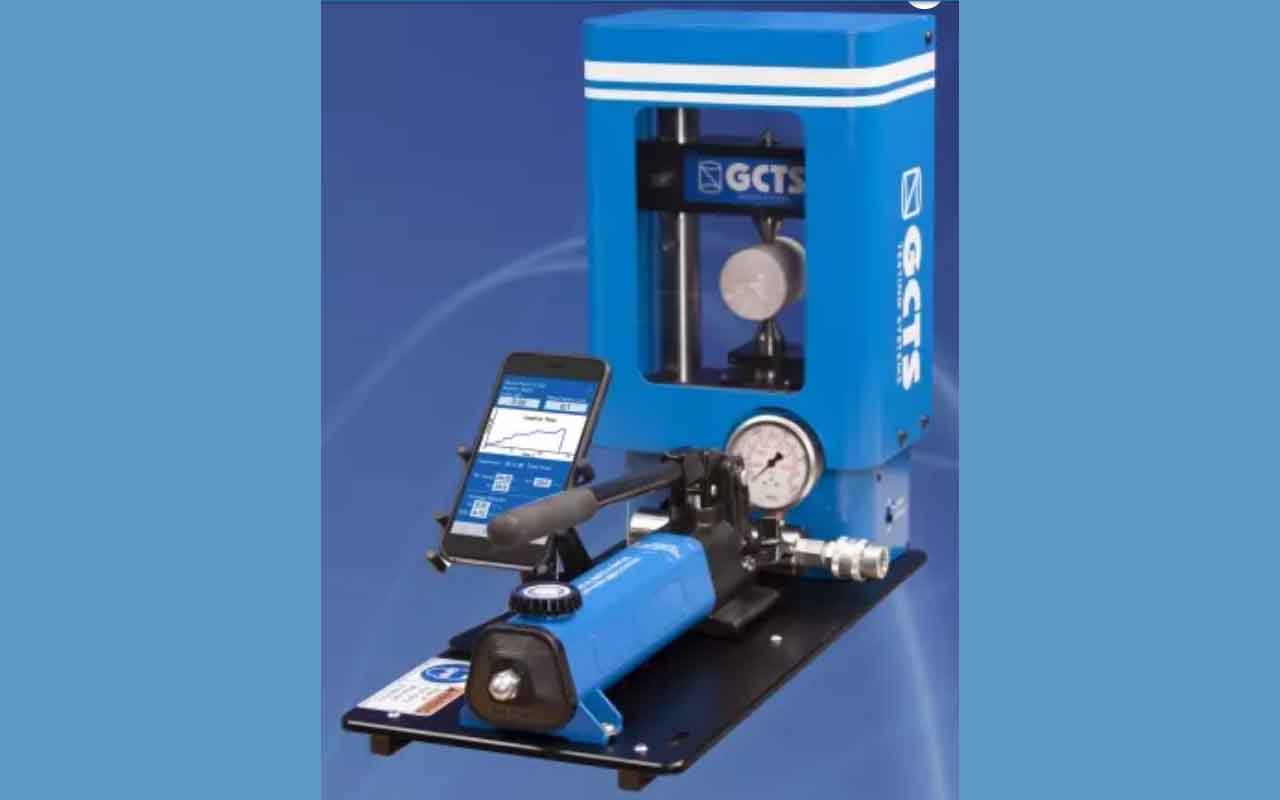Description
The GCTS PLT-2W Point Load Testing Device is an easy-to-use system made of light-weight, high-strength anodized aluminum that remains extremely accurate while being very portable. Due to the compact design, this test can be performed either in a laboratory or in the field. The PLT-2W is used to determine the rock strength index of a sample, which can be used to estimate the uniaxial compressive strength of the sample. The system includes software to automatically collect and analyze the data and report the average unconfined strength. It operates on battery power and is able to wirelessly link with an iPhone, iPad, or any mobile device to simplify data collection and eliminate unnecessary errors. All measured readings by the system are transmitted to the GCTS PLT App on the mobile device, allowing the user to view and analyze the data directly. The app also allows for the user to edit collected data as needed, and when ready, the data can be sent directly from the GCTS App to any email(s) the user desires.
Additional parts can be added to the point load tester to give it the ability to perform Brazilian, uniaxial, Brinell, and Ultrasonic Velocity tests. This allows the Point Load Tester to be a small, inexpensive device that can test a wide variety of rock strength parameters.
In the realm of geotechnical engineering, understanding the fundamental properties of rocks is paramount. One of the crucial methods employed for this purpose is the Rock Point Load Test. In this comprehensive guide, we will delve into the intricacies of this test, its significance in geotechnical studies, and its application in various projects. We will also explore Avantech’s innovative PLT-2W Wireless Point Load Test System, revolutionizing the way engineers assess rock strength.
What is the Rock Point Load Test?
Decoding the Core Concept
The Rock Point Load Test, often abbreviated as PLT, is a vital geotechnical testing method used to determine the strength of rocks. It measures the point load strength index of individual rock specimens, providing crucial data for rock characterization and classification.
In a typical PLT, a cylindrical rock specimen is subjected to a concentrated load until failure occurs. The applied load and the corresponding deformation are recorded, enabling engineers to calculate the point load strength index, which is a key parameter in rock mechanics.
Significance of Rock Point Load Test in Geotechnical Studies
Bridging the Gap in Rock Characterization
The Rock Point Load Test plays a pivotal role in geotechnical studies due to its ability to characterize rock properties accurately. By determining the point load strength index, engineers can assess the rock’s structural integrity, aiding in foundation design, tunneling projects, and slope stability analysis.
Enhancing Safety Protocols
In projects involving rock formations, safety is paramount. Understanding the rock’s strength through the PLT helps engineers establish appropriate safety protocols. This knowledge is particularly crucial in mining operations, where rock stability is a constant concern.
Avantech’s PLT-2W Wireless Point Load Test System: Revolutionizing Geotechnical Testing
Unveiling Avantech’s Innovation
Avantech, a pioneer in geotechnical testing equipment, introduces the PLT-2W Wireless Point Load Test System. This cutting-edge device combines precision and convenience, revolutionizing how engineers conduct rock point load tests.
Key Features and Benefits
- Wireless Connectivity: The PLT-2W offers seamless wireless connectivity, eliminating the hassle of tangled wires and ensuring data accuracy.
- Real-time Data Monitoring: Engineers can monitor test progress in real-time, enabling swift decision-making during tests.
- User-friendly Interface: The intuitive interface ensures ease of operation, making it accessible to both seasoned professionals and novice engineers.
- Robust and Portable: Built with durability in mind, the PLT-2W is also portable, allowing for on-site testing without compromising accuracy.
FAQs: Addressing Common Queries
What is the significance of the Point Load Strength Index?
The Point Load Strength Index, obtained through PLT, provides a direct measure of the rock’s strength. It is crucial for various geotechnical analyses, including slope stability assessments and foundation design.
Is the PLT-2W suitable for field applications?
Absolutely. The PLT-2W is designed to be portable, making it ideal for on-site testing. Its wireless feature enhances mobility and simplifies data collection in the field.
How does the PLT-2W ensure data accuracy?
The PLT-2W employs advanced sensors and wireless technology to ensure precise data collection. Real-time monitoring allows engineers to intervene if anomalies are detected, ensuring accurate results.
Can the PLT-2W be used for different rock types?
Yes, the PLT-2W is versatile and can be used for a wide range of rock types. Its adaptability makes it a valuable tool for geotechnical engineers working on diverse projects.
Is training required to operate the PLT-2W?
Avantech provides comprehensive training and user manuals. However, the system’s user-friendly interface ensures that engineers can quickly grasp its operation, minimizing the learning curve.
How does the PLT-2W contribute to project efficiency?
By offering real-time data monitoring and wireless connectivity, the PLT-2W enhances project efficiency. Engineers can make informed decisions swiftly, reducing downtime and ensuring timely project completion.
Can the PLT-2W be integrated with other geotechnical testing equipment?
Yes, Avantech designed the PLT-2W with integration in mind. It can seamlessly integrate with other geotechnical testing devices, creating a cohesive testing environment for comprehensive analyses.
Is the PLT-2W suitable for research purposes?
Absolutely. Researchers can benefit from the precision and reliability of the PLT-2W in various geological studies. Its accurate data collection makes it an invaluable tool in research projects.
How is the PLT-2W powered?
The PLT-2W is powered by rechargeable batteries, ensuring continuous operation during testing. Additionally, it features power-saving mechanisms to prolong battery life.
Does Avantech provide technical support for the PLT-2W?
Yes, Avantech offers comprehensive technical support to its customers. Our team of experts is available to assist with any technical queries and provide guidance on operating the PLT-2W effectively.
Conclusion: Advancing Geotechnical Engineering with PLT-2W
In the ever-evolving field of geotechnical engineering, staying ahead with advanced testing methods is essential. The Rock Point Load Test, facilitated by Avantech’s PLT-2W Wireless Point Load Test System, not only ensures accurate results but also enhances project efficiency and safety.
Embracing innovative solutions like the PLT-2W signifies a paradigm shift in how we approach geotechnical studies. As we move forward, the marriage of precision, portability, and real-time monitoring will continue to shape the future of geotechnical engineering, making projects safer, faster, and more reliable than ever before. Avantech’s PLT-2W stands at the forefront of this technological evolution, empowering engineers to conquer new frontiers in geotechnical research and project execution.
Relevant Testing Standards
- ASTM D5731 Standard Test Method for Determination of the Point Load Strength Index of Rock and Application to Rock Strength Classifications
- ASTM D7012 Standard Test Methods for Compressive Strength and Elastic Moduli of Intact Rock
- ASTM D3967 Standard Test Method for Splitting Tensile Strength of Intact Rock Core Specimens
- ASTM E10 Standard Test Method for Brinell Hardness of Metallic Materials
- ISRM Suggested Method for Determining Point Load Strength
- ISRM Suggested Method for Determination of the Uniaxial Compressive Strength of Rock Materials
- ISRM Suggested Method for Determining Indirect Tensile Strength by the Brazil Test



Reviews
There are no reviews yet.